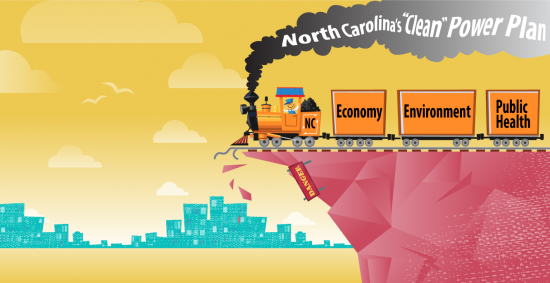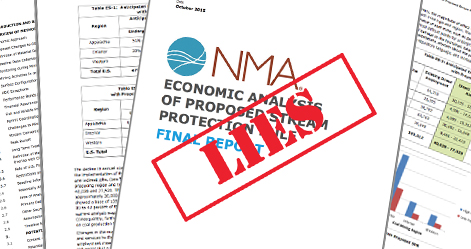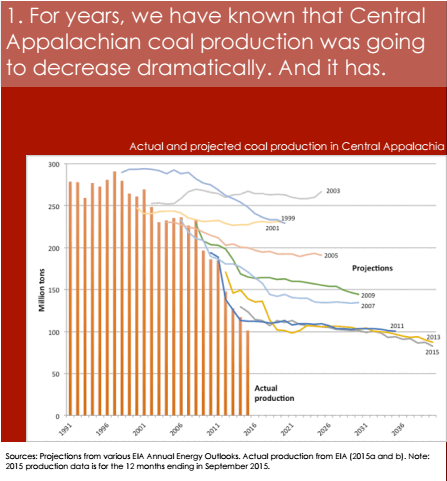Cleaning Up Coal Ash
For well over a century, power plants across the country have burned coal to generate electricity. And for just as long, leftover coal ash has been dumped in open, unlined pits near the power plant, usually located on a river or lake. Every year, U.S. power plants produce 130 million tons of coal ash, which is the second largest waste stream in the country after municipal garbage.
Coal ash concentrates the toxic heavy metals found in coal, including arsenic, mercury, lead and selenium. Stored in unlined, wet impoundments, coal ash has been leaking these toxics into our groundwater and surface waters for years. Sometimes these impoundments collapse — with disastrous results.
Yet government regulations for coal ash management are either non-existent or sparse, and there is little enforcement of the regulations that do exist. In North Carolina, this lack of oversight — and the complicity between state regulators, elected officials and Duke Energy — came to a boiling point in February 2014 when one of Duke’s coal ash impoundments spilled 39 million tons of ash into the Dan River.
Citizens living near North Carolina’s 33 coal ash impoundments — all of which have leaked — have fought for transparency from Duke and the state, and for cleanup of the pollution that threatens their property value, health and family. Their actions forced this issue into the headlines of news networks and to the forefront of environmental justice conversations in the United States.
Appalachian Voices stood with these communities as we worked for years to compel Duke Energy and the N.C. Department of Environmental Quality to excavate coal ash from all the North Carolina sites and dispose of it either in lined, dry landfills, away from waterways, or by recycling it for concrete or other uses, provided it’s done in a manner that protects public health and the environment.
On Jan. 2, 2020, North Carolina announced a historic settlement with one of the state’s most powerful corporations and polluters, Duke Energy. The settlement requires Duke to move nearly 80 million tons of toxic coal ash at six of its power plants to properly lined landfills onsite or recycle it.

Learn information about specific coal ash impoundments in the South, including health threats and safety ratings:
Additional Resources
Fact sheets, videos, links to academic research, and more
Sign Up to Act
Help us protect the health of our communities and waterways.
Latest News
North Carolina’s reckless approach to the Clean Power Plan: Part 2
The deadline for comment on North Carolina’s Clean Power Plan is just two days away and you may be wondering — why is providing input so important? It’s simple, because the Plan will will chart our state’s role in becoming a clean power state and will either lift citizens away from the contamination and impacts of fossil fuel use, or will commit us to more of the same destructive power sources.
North Carolina’s reckless approach to the Clean Power Plan: Part 1
North Carolina’s elected leaders and agency officials, with little say from the citizens they represent, have placed us on a reckless course in regard to our future energy mix and our ability as a state to determine that future. But together we can change that.
Coal, Congress and the art of lying
It’s amazing how much work goes into stretching the truth. It’s even more amazing when media outlets and political leaders latch onto that “truth” and peddle it without scrutiny. A recent and relevant example: an economic impact analysis of the Stream Protection Rule, commissioned by the National Mining Association.
Bleak outlook for coal in 2016
After the dismal year coal had in 2015, more hard times for the industry are ahead. Nowhere is the struggle more real than in Central Appalachia. A new white paper from Downstream Strategies tells the story of Appalachian coal over the past few decades in five simple charts.
Statewide citizens group slams North Carolina’s coal ash pond rankings
Contact: Statewide and Eastern North Carolina: Bobby Jones…
Coal’s death knell in Kentucky
The final months of 2015 may prove to be a historic moment for Kentucky’s politics and the state’s struggling coal industry. But it remains to be seen how the industry will maintain its political power in the Bluegrass State.










